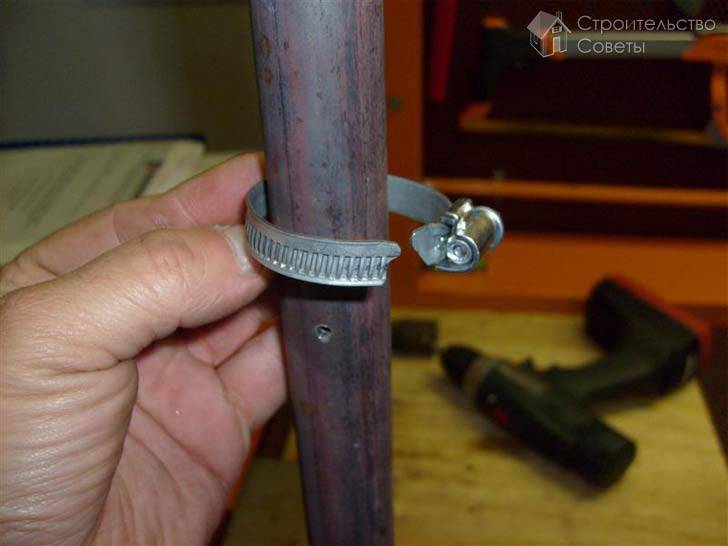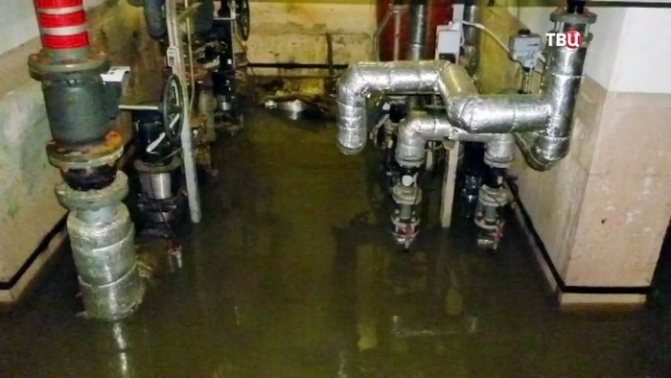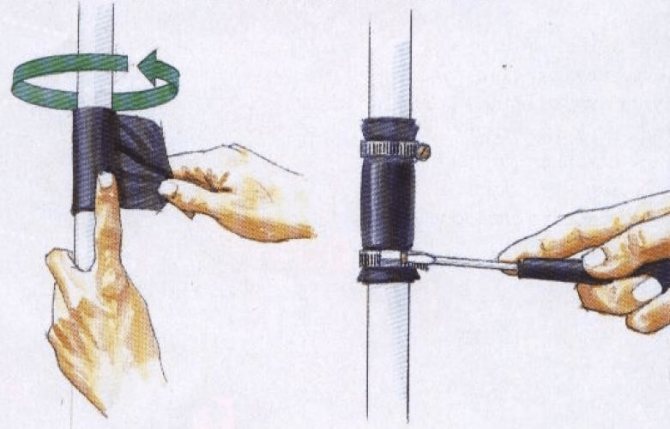How to identify the culprit of the flood?
Those affected by the flood contact the owner of the apartment with a claim, to which he counters that:
- Doesn't live in this house;
- The property has been transferred under a lease agreement to other persons;
- Make all claims to them.
There is a certain logic in this; it is valid when answering the question: if tenants flood their neighbors, who should pay? But subject to several requirements. First, the owner of the apartment, before renting it out, fulfilled his duties, which are assigned to him in clause 2 of Article 676 of the Civil Code of the Russian Federation, namely:
- Carry out the required operation of the real estate owned by him;
- Provides necessary utilities;
- Conducted routine repairs of property owned by common rights to all residents of an apartment building and equipment that provides access to utilities, which is located in the apartment.
A tenant, concluding an agreement for the sublease of residential premises, in accordance with the provisions of Article 678 of the Civil Code of the Russian Federation is obliged to:
- Use premises for living;
- Maintain the apartment and its communications in good condition.
Do you have a question about filling your property with tenants?
Ask it to an experienced housing lawyer as part of your consultation!
Hotline in Moscow
Ask a Question
On this basis, the culprit is determined based on the following:
- The condition of equipment and machinery upon transfer to the employer.
- Flooding is a consequence of a malfunction or improper operation.
- The presence in the terms of the agreement between the owner and the tenant of clauses that define the responsibilities for the maintenance and servicing of the washing machine, taps, pipes, etc.
The peculiarity of the consideration in court of disputes related to the flooding of housing by tenants is that it is the apartment owners who are considered to be the culprit, and not the tenants.
Housing sublease agreements are often drawn up in a formulaic manner, without taking into account the nuances that may arise in the future. The owners do not strive to comply with the requirements of Article 676 of the Civil Code of the Russian Federation and bring the apartment into proper condition, and most importantly, document it. Therefore, it will be difficult to file a claim against the tenant in the event of a flood.
You can read more about responsibility for flooding an apartment here.
Determining those who compensate for the damage
Dealing with tenants is a matter for the owner. Affected residents are not required to know who lives above, whether the apartment is rented or whether the owners live in it. Moreover, according to the provisions of Articles 210 of the Civil Code of the Russian Federation and 30 of the Housing Code of the Russian Federation, the owner has the obligation to:
- Maintain your home in good condition.
- Prevent mishandling of it.
- Do not violate the rights and interests of other residents of the house.
However, if tenants flood their neighbors, who should pay for the damage? They can address all claims of affected neighbors to the owner of the apartment. He is responsible for the condition of his property. Exception - these responsibilities are transferred under the contract to other persons.
Therefore, owners of flooded apartments will address all claims to the owner of the home where the leak is coming from. They will:
- Take measures to stop the flooding (notify neighbors, management company or housing office, emergency service).
- Require utility workers to draw up an apartment inspection report after the flood;
- File a claim with the culprit.
- If you refuse to voluntarily settle the dispute, call a damage assessment expert and get his report.
- Draw up and file a claim in court.
For those whose apartments are insured, paragraph one is added by informing the insurer, and then:
- The apartment is provided to a specialist from the insurance company, who conducts an examination and presents the result of the assessment of the damage caused.
- If the company’s expertise raises doubts about its objectivity, an independent assessment of the harm caused is ordered.
- An application for payment of the insured amount is drawn up and sent to the insurer, to which an act, policy, and expert report are attached.
- If the company does not pay the money in full or refuses to pay, a statement of claim is filed.
wet business
On the one hand, such a conflict seems to be an absolutely banal situation that many people find themselves in. But, on the other hand, quarrels, disputes, courts and complaints about compensation for property damaged by leaks drag on for years. Litigations regarding residential leaks are not only lengthy. They ruin your nerves, take up a lot of time, and end up costing both the victims and the perpetrators a hefty sum.
According to the court, both the developer and the owner of the apartment in which the pipe burst were to blame for the utility accident
It all started with a claim from the owner of a “wet” apartment, which was flooded by a neighbor from the apartment located on the floor above. The cause of the flood turned out to be a breakthrough in the cold water supply system - “at the junction of the coarse filter and the pressure regulator installed outside the balance sheet of the manager they laid down” the defendant, the neighbor above. In court, the management company stated that the defendant installed “a metal tie that was inadequate for fastening water installation pipes, which secured the water intake unit flush to the wall.” But this was impossible to do. The local courts did not involve the developer in the case.
The district court partially satisfied the claim. According to the court, both the developer and the owner of the apartment in which the pipe burst were to blame for the accident.
The court divided the degree of guilt as follows: 75 percent of the developer’s fault, 25 percent of the defendant’s fault. Explaining the defendant's guilt, the district court said that he installed a metal tie in the plumbing closet of his apartment to secure a cold water pipe, and this “resulted in a violation of the structural condition of the cold water supply system.”
The court also said that the plaintiff “is not deprived of the opportunity” to independently file a claim against the developer for damages. The losing party did not agree with this decision and appealed the decision.
The appeal reviewed the case and completely denied the claim to the owner of the affected apartment. The second instance referred to the opinion of an expert who did not see any violations on the part of the defendant.
The expert stated that the installation of the equipment to the wall, installed by the apartment owner, could not “cause flooding.”
The cause of the accident, according to the expert, was poor quality equipment of the cold water supply system, which was incorrectly installed by the developer.
The expert concluded that the leak was caused by both defective equipment and the actions of the apartment owner
That is, the cause of the flood, judging by the specialist’s explanation, was a violation of engineering rules during the installation of equipment, plus a defect in the equipment itself.
The owner of the apartment, as the expert clarified, simply could not see this problem either during the inspection of the new housing when he received it, or when signing the act of acceptance of the apartment.
It must be understood that there were dissatisfied people with this decision of the appeal court. So the case ended up in the Supreme Court of the Russian Federation. There they requested a civil case, studied the materials of local courts, read the arguments of the parties and did not agree with the conclusions of the appeal.
This is how the Judicial Collegium for Civil Cases of the Supreme Court of the Russian Federation considered this dispute about a flooded apartment.
The Supreme Court began its explanations by citing the Housing Code. This code (Article 17) states that the use of residential premises must take into account the rights and legitimate interests of citizens and neighbors living in this premises. The rights and interests of citizens are sanitary, environmental, fire and other well-known safety rules. You also need to take into account the rules for using residential premises.
According to the Housing Code (Article 30), the owner is obliged to maintain the apartment “in proper condition”, preventing “mismanagement” of it. As well as Rules for the maintenance of common property of premises owners in an apartment building.
Further, the Supreme Court quotes the Civil Code and its Article 1064, which states that harm caused to the person or property of a citizen is compensated in full by the one who caused it.
And a person can be freed from the obligation to pay for harm caused only if he proves that the harm was not caused through his fault. The next article of the same Civil Code, 210, states that the property in the apartment is maintained by its owner (unless otherwise provided by law or contract).
The Supreme Court emphasized that, within the meaning of this provision of the law, the burden of maintaining the property by the owner also implies his liability for damage caused as a result of “improper maintenance of this property.”
And here’s what’s important: the Supreme Court noted that the fact that the owner received this property “already in poor condition from another person” does not in itself relieve the owner from liability for damage caused to this property.
Local courts found that the damage to the plaintiff’s apartment was caused by the “improper condition of the property” of the neighbor on the top floor, which he received from the developer under an agreement to participate in shared construction.
Plus, the owner himself made changes to the design of the cold water supply system equipment that had already been installed incorrectly by the developer. This together provoked the accident. Now, if the developer had done everything correctly, then even the additional “improvements” made by the tenant would not have caused an accident.
It was the expert who determined that the interaction between the developer’s defective equipment and the tenant’s “improvement” ultimately caused a waterfall from the ceiling.
The appeal referred to the Law “On participation in shared construction of apartment buildings and other real estate and on amendments to certain legislative acts of the Russian Federation.”
In denying the claim of the owner of the flooded apartment, she cited this particular law on shared participation. To this statement of appeal, the Judicial Collegium for Civil Cases of the Supreme Court responded as follows:
“The appellate court did not indicate which, in its opinion, provision of this law provides for the possibility of releasing the property owner from liability for damage caused to the property of third parties.”
Here is what is useful to know for citizens who find themselves in such a “wet” situation:
The Supreme Court explained: the developer's warranty obligations apply to the contractual relationship between the developer and the participant in shared construction, which, in relation to the apartment where the defective equipment is installed, is the defendant, not the plaintiff.
The decision of the appeal in this case was canceled by the Judicial Collegium for Civil Cases of the Supreme Court of the Russian Federation. And she sent this civil case back.
The dispute about a flooded apartment and liability for the water-damaged property of the apartment on the floor below, according to the decision of the high court, will eventually be reviewed, but taking into account the clarifications of the Supreme Court.
Who is to blame for the pipe burst?
Who is to blame for the burst pipe in the apartment? This is a very important and necessary question that appears immediately after the flood problem is eliminated. In the case where this happened in a private house, laying the sewer system is the responsibility of the owner. Accordingly, all problems that may arise with the plumbing system fall solely on his shoulders.
If the breakthrough was in an apartment building, then several options are possible.
- If a pipe breaks from the riser to the first tap, then the management organization that manages this house will be responsible for all this; in fact, all complaints should be addressed there.
- The remaining pipes in the house are the problems of the residents. Therefore, you need to monitor the condition of the pipes, change them from time to time, clean them, and so on.
- If a problem arose with the heating system, then this is a completely different case - the management company should bear all responsibility if the tenant did not change anything in the system.
Now you know exactly what actions need to be taken if a pipe breaks. To ensure that such an incident never mars your life, you should regularly check the condition of the pipes. If they need to be repaired or replaced, the management organization must be notified. You also need to inspect the pipes that are installed in your home and replace various parts if necessary. The presence of rust, drips and other inconsistencies indicates that the pipe is in unusable condition
You also need to inspect the valve in the basement - it is important that it functions correctly and can be easily unscrewed and tightened. After all, if an emergency does happen, you will need to quickly turn off the water supply system
Situation 3: a riser burst in a residential building owned by a housing cooperative
In an apartment maintained by a housing cooperative, the rules for distributing responsibility for communications are the same as in a regular apartment building. But, in accordance with the Housing Code of the Russian Federation, the situation changes when the moment of complete redemption of the apartment arrives.
At the same time, the charter of the cooperative comes into force, which stipulates the balance sheet ownership of the common risers of utilities and the payment procedure in case of their necessary replacement.
In relations with operating services, you also need to know that the Rules for the provision of services provide for autumn and spring inspections, which are aimed at identifying weak points of engineering equipment. And if a housing office employee expresses a desire to inspect the risers in your apartment, do not interfere with him. Since subsequently, your refusal to allow the employee into your home may be turned against you.
Common factors for flooding of neighbors below and the guilty party
The initiator of an accident is not always the culprit - what to do if the neighbors below are flooded. Of course, when a citizen’s washing machine leaks, this is one case, but a central heating pipe is another. In both precedents, different persons are held responsible. It is proposed to consider each situation specifically, identifying the initiator of apartment flooding.
The water supply manifold burst
Water leakage to neighbors can occur due to the emergency position of the riser, which is on the balance sheet of the management organization. According to Decree of the Russian Government No. 491, utilities for hot and cold water are classified as the general property of apartment buildings.
Burst of pipe or hose
If a leak occurs to the bathroom or kitchen after the apartment shut-off and control valves and floods the neighbors below, the owner of the living space must be responsible, since a flexible hose or pipe suitable for the faucet is personal property. However, the owner is not always responsible.
Battery or heated towel rail
If a radiator or central heating riser bursts and floods the neighbors, the housing office is to blame. When the battery was reinstalled by a tenant, the initiator of the repair is considered responsible for the flooding; in case of rupture of the old original heating system structures, the housing authority is considered responsible.
However, after a forensic technical examination, it may emerge that the apartment element could not withstand the temperature difference and burst due to hypothermia. The shut-off valve installed on the radiator outlet is closed at the end of the heating period.
Possible causes of flooding.
The owner is responsible for the operation of the unit in the event that the latter was constantly leaking, but was not repaired, or a new one was installed independently. According to Art. number 30 of the residential complex of Russia, restoration and compensation for damage is at the expense of the owner of the property.
Battery burst when venting
In the attic of a building, housing office workers must specifically install relief valves, which is sometimes not done. Such an operation is carried out by the housing office. Therefore, if the radiator ruptures during air release, the control structure becomes responsible for the incident.
The water filter burst
Not only coarse filters, but also fine filters, which are installed in high-rise buildings, can be destroyed due to several factors:
- manufacturing defect;
- incorrect installation;
- high pressure.
If the latter happens, the housing office is to blame for the accident, but he can also disown this, saying that the installation of the system is an unforeseen redevelopment of communications.
The drain is clogged
Clogging of the sewer and its flooding with water from lower neighbors is an even more unpleasant phenomenon than flooding of an apartment from water supply pipes.
Causes of drain malfunction:
- wear of the network or installation of a small diameter;
- violation of installation, slope;
- the toilet is not properly secured;
- leaky device;
- foreign objects entering the sewer that cause clogging.
If a resident accidentally threw a rag or paper into the bidet, which blocked the flow of water from the upper floors, resulting in flooding of neighbors, the initiator of the accident will be held accountable by law.
A situation that occurs for other reasons is within the scope of action of the service office. Repair of in-house utilities is the responsibility of the management company (Federal Law No. 185 with the latest amendments and additions of 2021).
Washing machine or dishwasher malfunction
If flooding of neighbors occurs due to the failure of a washing machine or dishwasher, its owner is primarily responsible. The owner did not check the exit of the hose from the sewer pipe.
When the installation company installed the machine in the apartment, responsibility passes to it due to the use of low-quality parts, poor sealing, and other factors.
Refrigerator leaking
If the owners set the refrigeration unit to defrost and left the house, forgetting about it, the blame lies with them. However, while the equipment was working, the electricity could be cut off for a long time, which led to flooding of the neighbor’s lower apartment. In such circumstances, you must contact your local electrical office.
The battery burst, the neighbors were flooded - who is to blame?
What to do when the heating becomes unusable and the neighbors suffer? Where to find the culprits?
First you need to find out whose fault the accident occurred. Who is to blame: the owner of the apartment or the management company that monitors the condition of the heating pipes of the entire house. If the heating breakthrough occurred due to the fault of the owner, then he will compensate for the damage to the neighbors flooded from below. If it is the fault of the management company, then all expenses for repairing the premises will be borne by it.
If the pipes are in poor condition, you need to contact the housing office and call a specialist. The invitation of a specialist must be officially formalized. It is necessary to fill out a request, which will be registered and a repair time will be set. After the work is completed, an acceptance certificate is issued, which is signed by the owner of the apartment and the specialist.
If all stages are followed, the management company will bear full responsibility for improper installation of heating pipes.
At his own expense, the owner of the apartment must repair those appliances that have stopped working due to his fault. For example, faulty plumbing. However, repairs to these devices can only be carried out by a company specialist with the consent of the housing office. If the owner changes the plumbing himself, then if the neighbors below flood, all responsibility will most likely fall solely on him.
The management company must repair and conduct routine inspections of the heating system in apartments at least 2 times a year. After the inspection, a report with the results is issued. If the owners do not allow a specialist into the premises, then this amounts to improper use of communications. And in the event of an accident, the owner of the premises may be found to be at fault.
Heating season or not, the subtleties of the issue
Since in winter the water flows through the pipes is very hot—over 55 degrees Celsius—there is a high risk of burns if the heating breaks through. If pipes are leaking, then it is not advisable to do anything on your own. Before the arrival of specialists, it is necessary to save flooded property, documents, and valuables.
In the summer, the management company carries out routine inspections of pipes in high-rise buildings. The house, whose residents are warned about this three days in advance, is checked by running cold water under pressure through the pipes. If the batteries in any apartment are worn out or leaky, they will leak. Therefore, the management company asks that all apartment owners be at home at a certain point in time during the inspection.
If the owner notices that water is flowing in his or a neighbor’s apartment during the inspection, then he needs to contact repairmen. They will change the batteries at the expense of the management company.
Actions in case of a small leak
If the rupture is minor and the leak is small, you can deal with this problem yourself in several ways. If it drips from a pipe due to its damage, you can close the leak with a homemade device in the form of a clamp. You just need to have a suitable piece of rubber on hand from which you can cut the gasket. An inner tube from a bicycle wheel, a glove with a rubber base, or some other product that, when stretched, can compact the problem area, is suitable for this. In addition, a fabric strip, a piece of wire, a screwdriver and a tin sheet will come in handy.
- The rubber needs to be wrapped with wire and fixed to the gasket with pliers.
- This design must be supplemented with a fabric strip wrapped in several turns. The ends of the strip must be connected with a knot.
- A screwdriver, large nail or similar handy object should be inserted under the knot and begin to rotate until the material is pulled tightly around the homemade bandage.
- You can also fix the problem area with a tin sheet. A clamp is cut out of it, at the edges of which 2 holes are made. A bolt is inserted through the holes and a nut is screwed onto it. There should be two homemade clamps. They should be on a rubber gasket on opposite sides of the breakthrough site.
READ ALSO: Useful homemade products from plastic pipes

To eliminate a minor accident, you can use the cold welding method. The substance used has such characteristics that it can be worked with even in an aquatic environment. Therefore, they can safely seal cracks or holes in a broken pipe.
There is another way to seal a pipeline break. When using this method, you need to use a medical bandage and epoxy resin.

- Epoxy resin is mixed according to the instructions.
- A bandage of the required thickness is wrapped around the breakthrough site.
- Then the prepared epoxy mixture is spread onto the bandage winding.
- After this, it’s the turn of the bandage again. You need to make several of these layers.
Breakdown of the heating system during the heating season
An emergency situation that arose during the winter period belongs to a special category of incidents. When heating pipes break, at this moment the fear is not even that water will begin to flood the room. There is a high risk of getting burns from hot water.
Attempts by residents to fix such breakdowns on their own are extremely undesirable. It is recommended, if possible, to ensure the safety of people and the safety of valuable property, including documents.
In the summer months, the management company is obliged to carry out scheduled pressure testing of heating equipment, which consists of running cold water through the pipes. In such cases, as a rule, damaged pipes make themselves known through leaks.
Residents are notified of the inspection at least 3 days in advance so that they can adjust their plans and be present at home at the time of the event.
An owner who notices leaking pipes in his or a neighboring home contacts repairmen, and the repairs are carried out at the expense of the management company.
Your actions in case of a breakthrough in the basement

If you discover a broken sewer pipe in the basement of an apartment building, then the first thing you need to do is shut off the risers and warn all residents not to use the sewer. Since the housing office or management company is responsible for the condition and serviceability of all internal public water supply and sewer systems, the housing office or management company should be called there first. They are obliged to send a team of emergency workers as soon as possible and eliminate the break in the sewer pipeline.
READ ALSO: Fellow plumbers! Give me some advice! photo- Mastergrad Forum
To minimize the consequences of a flood before the crew arrives, you can do the same as in the event of an accident inside the apartment. That is, you need to try to eliminate the leak in the basement using a clamp, cold welding, or a plug.
A pipe burst in the apartment and flooded the neighbors, who is to blame and what to do
Situations where a pipe burst and flooded neighbors happen infrequently, but are always controversial. After all, the question arises who is to blame and who will be responsible for repairing the heating and restoring the normal condition of the neighbors’ apartment. Let's look at this topic in more detail below.
What to do if a hot water pipe bursts
First of all, you need to be careful not to get burned, because the water can be very hot.
Proceed as follows:
- Shut off the riser in your apartment to prevent new water from entering.
- Be sure to turn off the electric meter, as water is highly conductive.
- If the temperature allows, then start collecting water with a rag. This way, neighbors on the lower floor will suffer less.
- Place any container under the damaged pipe - a bucket, basin. Better let the water flow there.
- Call a plumber. If this happens at night, call the emergency service of the city water utility.
By the way, if a plumber changes a part of a pipe, faucet or any other element that has become unusable, then save it. This can help in identifying the causes of the breakthrough.
A heating or water pipe has broken
Make something like a clamp from scrap materials. Take rubber, thick fabric, wire. Wrap the break area and secure with wire using pliers. You can try to cover it with cold welding.
But even if the leak is eliminated, remember that it can recur at any time. And a major overhaul is needed. Just don’t do it yourself, without notifying the service company.
After eliminating the hole, we advise you to take a photograph of the “accident site” and record each drip. This will help you prove your losses. Of course, if the cause of the accident is not your own.
But really, who can be to blame for pipe bursts?
Let's look at the nuances:
- If the leak occurred before the first tap from the riser, then the management company must be responsible. The owner of the apartment is responsible for all other pipes, as well as sewerage.
- The risers and heating radiators are also managed by the management company.
- If the owner repaired them or installed new radiators and did not notify the housing office, then he himself is to blame.
The document is drawn up in two copies and must contain the following information:
- address where the accident occurred, date of the incident;
- a description of what happened to the application list of damages;
- probable causes of the breakthrough;
- data of the persons who drew up the act.
Read the document carefully before signing it. Make sure that everything is reflected correctly and completely.
The heated towel rail burst and flooded the neighbors - what to do
The heated towel rail is a common property (see Decree of the Government of the Russian Federation dated August 13, 2006 N 491 with the latest amendments). But different people or organizations may be responsible for its failure:
- If the coil is new, and water flows from it itself, then the fault falls on the manufacturer.
- When the house itself is a new building, the developer will be responsible for the impulse.
- If the coil was old and leaked regularly, then the apartment owner is to blame. After all, he must monitor the safety of not only the pipes, but also the entire room (apartment).
- If the heated towel rail was repaired on time, then the management company is responsible.
However, the guilt of the management company or developer must still be proven. Therefore, get ready for numerous examinations, showdowns, and if the damage is significant, then to court.
Situation 1: the common riser in the apartment burst as a result of an accident
All apartment buildings are given for balance maintenance to communal organizations, which in their work are guided by [1] the Housing Code of the Russian Federation, [2] Rules for the operation of residential buildings (Government Decree No. 170) and other methods and regulations.
Based on regulatory documentation, there is a balance sheet ownership of communications assigned to public utilities and owners of residential premises. Thus, risers for cold and hot water supply, sewerage, and central heating fall under the responsibility of public utilities.
In municipally owned apartments, utility organizations are also responsible for intra-apartment distribution pipes and plumbing fixtures installed in the apartment.
All accidents that occur on the risers of utility systems must be eliminated at the expense of the utility organization. As well as the material damage caused as a result of flooding to the premises in which the incident occurred and to those located below, but also to the victims.
The main nuance in this matter is that the owner is responsible for the technical condition of the pipes in the home. That is, if corrosion is detected on pipes or places of possible leakage, the homeowner is obliged to notify the operating organization about the detected flaw in order to avoid an accident.
By his appeal, the tenant relieves himself of responsibility for upcoming events and places the blame and material losses on the utility organization. The appeal must be submitted only in writing. Make it in two copies and it is advisable to attach photographic material of the worn pipe. One copy, which remains with the consumer, must bear a mark indicating receipt of the application from the responsible employee of the utility organization.
To confirm the absence of your fault in a possible accident, it is necessary to require the creation of a commission and the drawing up of an inspection report of the emergency pipe. The act is signed by all members of the commission and the initiator of the commission. In case of disagreement with the drawn up act, the tenant can write a special opinion, setting out his objections to the essence of the issue. A copy of the act is given to the consumer.
To a written request, the utility agency must send a response within the time limits established by law. The law allows a period of up to three days to consider an emergency or pre-emergency case. In the response to the consumer, utility companies indicate the accuracy of the facts stated in the complaint, methods for eliminating them and the timing of the work.
An answer provided not on time, not in substance or not in full can be appealed to the prosecutor's office or to the territorial office of Rospotrebnadzor.
If an accident occurs and you have correspondence with the utility office, the tenant remains completely innocent in the current situation. This is especially true when premises with expensive repairs or valuables are located on the lower floors.
What needs to be done right away?
If you saw a breakthrough with your own eyes and were left without injuries, then you are incredibly lucky: after all, you still have a chance to minimize losses.
But to do this, you need to do the following without delay:
- Calm yourself and your family.
- Bring and place a container under running water. Moreover, it is best if the container is plastic. After all, if a heating pipe bursts in winter, then boiling water heated to 70-95 degrees Celsius will flow out of the system, and as a result, the metal container will burn your hands. Of course, the container must be wide enough: after all, the water will not rush out in a thin stream, but in a wide stream. Therefore, a baby bath or basin is best suited for these purposes.
- After installing the water collector (container), you need to leave a person on duty next to it, who will take out the drained water and pour it into the toilet or sink. If you can find two containers in your apartment, use them alternately, draining water from one while the other is filling.
- While everyone is fiddling with the containers, a free person must run to the basement, where the central valve for the heating system of the entire house is located. Accidents of heating systems during the heating season are generally a terrible thing, but in this case there is still one plus: the utility workers managed to check the functionality of the central valve. And since the valve is working, the water pressure can be turned off at any time. Which is what you should do.
- After the valve is closed, you can call plumbers and utility workers. And if you are sure that the reason for the rupture of the heating pipe is not related to your modernization of radiators, then it is better not to touch anything in the apartment. Let the utility workers see the depth of their fall in the eyes of the alarmed residents of your entrance.
How to survive a pipe burst alone?
Of course, all the measures described above are only suitable if there are several people in the apartment during a breakout.
Therefore, if the heating pipe inside the apartment bursts and you are the only one in the house, then you better focus on the following actions:
- Place a container under the stream of boiling water
- Dial the emergency number and report the breakdown. Open the doors to the apartment.
- Continue draining the container as it fills.
- Dial the number of a friend who lives in your or neighboring building. And ask him to turn off the valve in the basement of the house.
After such a marathon, all you have to do is hold out until the emergency team arrives.
A heating pipe burst - who is to blame?
Further actions to localize the consequences of the breakthrough should be related to the search for those to blame for the incident. After all, someone will have to answer for the destroyed apartment of the owner of the broken pipe and for the flooded apartments of the neighbors. You should also search for the last resort if a breakthrough happened in your absence. After all, all losses (yours and your neighbors) are paid by those responsible for the accident of the heating system in the apartment. Therefore, get ready for a not-so-pleasant dialogue with utility workers and neighbors next door.
Of course, any owner of an apartment that has experienced a heating system breakdown strives to position himself not as the culprit of the accident, but as the injured party. And in order to remain the “victim,” the homeowner must understand the cause of the accident.
There may be several reasons for this, namely:
- A break in a valve or at a pipe junction that occurs as a result of errors in the installation of connecting or shut-off valves.
- A break in the pipe body that occurs due to mechanical deformation or aging of the transport fittings.
- A breakthrough in the radiator resulting from depressurization of the battery.
Simply put, if you have not changed the pipes or radiators, then the HOA is responsible for the heating system. Accordingly, all problems with breakthrough are projected onto your utility workers.
But if you managed to intervene in the design of the heating system, then any defects in the new equipment that provoked the accident will turn into your personal problems. Moreover, your intervention will be determined by even the most superficial check of the condition of the heating system, carried out during the post-accident repair process. That is, all accusations of utility workers, in this case, will be groundless. The culprit of an accident in a non-standard, actually home-made system will be recognized as the owner of the apartment.
Where to call if a pipe burst in your apartment
If you find a leaking pipe, hurry up and ask a plumber, whom the house management organization (DUK) must send. You should also go there if the pipe has already burst.
You can find information about which company services a specific address via the Internet, you can also look at advertisements at the entrance or see its name on the rent receipt. It is better to keep such numbers at hand, specifying them in advance. You can contact management specialists on weekdays during business hours. Most often they also have some kind of emergency number that is available 24 hours a day.
If a leak occurs when the DUK is not working, you need to call either its emergency dispatcher or the emergency repair service in the city.
The dispatcher will contact specialists and send them to the scene of the incident. You must understand that such actions can only be resorted to if the pipe is leaking so badly that it is impossible to cope with the problem on your own.
What to do if a hot or cold water pipe bursts
If a leak occurs in pipes with cold or hot water, you should contact the employees of the management company or the emergency department. They will send plumbers, and if the damage is serious, they will contact the emergency services themselves. If it is after hours, immediately dial the Vodokanal repair service number. The dispatcher will send specialists to you. After eliminating the accident, ask to draw up a report indicating the location of the leak and the cause of the problem.
Residents often get confused and don’t know what to do to prevent water from flooding all the lower floors. When a pipe bursts and water arrives quickly, the actions fit into the following scheme:
- Turn off the electricity supply to the room.
- Shut off the common riser or discharge pipes in the apartment.
- Report the leak to the emergency dispatcher or management company employees.
It is easier to fight a flood with helpers. While one person calls the specialists, the rest scoop out the accumulated water, preventing it from leaking to the lower floors.
A pipe has burst, where to go and how to fix the leak
Where to contact
Who should you call urgently if a water pipe has burst in your home?
When the water supply breakthrough is really large and it is impossible to carry out repairs on your own due to lack of time, skills and/or special materials, you can call representatives of plumbing services. Moreover, the choice of organization depends on the day of the week and time of day.
Weekday business hours? Then you should call the ZhES (housing maintenance service). Its number should be in the information table at the entrance or on the website of the management organization.
Did the water supply break happen at night or on one of the weekends/holidays? It is necessary to call the emergency services (emergency service of the water utility unit assigned to the district).

What to do if a pipe bursts in your house
- The first step is to place any container under the stream so that the water does not spill onto the floor. This can be a bucket, basin, pan - anything that will hold a sufficiently large amount of liquid while the problem is being eliminated. The containers must be emptied periodically;
- Next, turn off the water supply tap all the way. It is located either in the apartment near the water meters, or in the basement of the house (in this case, you will need keys to the basement). It should be taken into account that if you turn off the tap in the basement, everyone who lives in the entrance will lose access to water;
- After making sure that the water has stopped flowing, you need to start collecting it from the floor as soon as possible. To do this, use any convenient means: a cloth, a sponge, etc.
READ ALSO: How to connect plastic pipes for water supply: connection without soldering, video
Now you need to seal the leak. To do this you will need the following tools:
- a piece of rubber (a piece of inner tube from a bicycle, a glove for cleaning the house) or other similar material that is impervious to moisture and capable of stretching;
- two screw (worm) clamps or wire;
- a strip of thick fabric or a sheet of tin (for example, cut from a beer can);
- a wrench or a screwdriver for a clamp.
- Wrap rubber or other similar material around the leak as tightly as possible. With tension and, preferably, in several layers;
- Secure the winding with clamps or wire until it stops;
- Wrap the structure with a piece of fabric or a strip of tin prepared in advance and secure it. In the case of tin, the edges of the strip should be connected with a pair of screws or screws and nuts of suitable size;
- For additional moisture insulation, it is recommended to use wide tape or cling film.

A replacement for these materials can be epoxy resin and an ordinary medical bandage (or other fabric). You just need to mix the resin as indicated on the package and soak the bandage in the mixture. After this, wrap the bandage with a wide overlap around the leak area with as many turns as possible and apply the resin on top. Repeat several times.
You can also apply a special material called “cold welding” directly to the leak site. It can even be used in water - but you need to be extremely careful if it is hot water: getting burned in this case is a matter of a couple of seconds.
This “ambulance” will help the pipe hold out until professional plumbers arrive. Although it happens that such temporary measures help not for a day or two, but for several months.
Nikolay, utility employee:
“Not everyone has a supply of clamps at home. In principle, any tightening material is suitable for a temporary patch: you can use a clothesline, wire, or even a regular medical tourniquet. Some people use rags and tape. But in order for the adhesive tape to hold tightly, you need to thoroughly degrease the surface - for example, with gasoline or acetone. Stopped the leak? All that remains is to call and wait for the plumber to arrive.”
What to do in case of emergency
If a riser in an apartment bursts, who is to blame, what to do in this situation is not directly established by regulations and safety rules. However, the victim should immediately receive a certificate confirming the flooding. It is issued by property managers. This is the most important document that every owner who finds himself in a similar situation should have.
The procedure is as follows:
- as soon as a breakthrough is discovered, you must immediately report the incident to the house management company (MC), which is responsible for the housing property of the house;
- if electrical appliances are located in the flood zone, the room must be immediately de-energized to prevent a short circuit;
- Often it is not possible to repair a leak on your own. In this case, you can try to slow down the amount of water making its way through the cracks. To do this, a wooden plug (chopik) is hammered into places of deformation. This will reduce the water pressure for a short period of time;
- The next step should be photo and video recording of visible damage. You need to photograph the breakout point especially carefully. If possible, victims should call their neighbors to document the accident in the presence of witnesses. If the situation goes to trial, testimony from third parties will help victims in this process;
- The final stage is to record the exact time and date when the accident occurred.
Loading …
Once all the prescribed actions have been completed, the injured owner can only wait for representatives of the management organization. They will draw up the necessary inspection report of the premises and the consequences of a pipe break.
Actions during inspection and repair
If a worker from the authorities responsible for carrying out repairs comes to the owner after 24 hours, he should not be immediately allowed to work. First, he must hand over the fully completed act personally to the owners of the apartment. If such documentation is not received, in the future, after the repair of the emergency riser has been completed, it will be difficult to prove that the breakthrough did not occur through the fault of the owners.
The certificate of completed work must bear the seal of the management organization, the signature of the foreman who performed the work, and the date. If, after completion of the restoration work, a section with a gap is still visible on the riser, the report remains with the owner. The document will be actual evidence of a pipe break.
Important! Qualified lawyers recommend that in order to resolve various issues not to call the governing bodies, but to conduct written correspondence, on which special marks must be placed on the acceptance of the documentation
Judicial practice on compensation for damage caused by a burst riser
The case was heard by the Oktyabrsky District Court of Samara. By decision of February 27, 2021, in case No. 2-561/2018, a decision was made to compensate the owner of the apartment for damages caused. The owner of the residential premises filed a claim in court. He acted as a plaintiff. His demand was to recover money from the management organization (acting as a defendant) for monetary compensation for damage caused to property as a result of a break in the riser. The defendant did not admit his guilt, despite the fact that the communications related to common property for which he was responsible.
The defendant justified his position by the fact that the plaintiff did not agree on the reconstruction of the pipes in the apartment. The court made the following decision in the case under consideration. Since the defendant performed his duties to inspect the risers improperly, the management company must compensate 50% of the damage caused in favor of the plaintiff.









